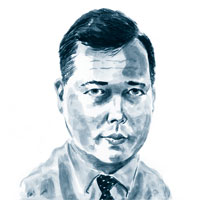The power of the prescription pad

We should never, ever forget what a privilege it is to wield a prescription pad, or the power and responsibility that comes with it. Whenever I think about it, I am humbled by the potentially terrifying outcomes. The decisions we make can be, and occasionally are, definitive, in the life-defining and (luckily rarely) life-ending sense.
Alright, 90% of the time we are banging out scrips for trimethoprim or clotrimazole cream and no one is going to suffer much if we do or we don’t. But we have the other 10% to consider.
I have many times in this column expressed my opinion that, apart from dressings and other superficial stuff, prescribing should be left to those of us who have trained long and hard to earn the right to do it. But, from time to time, we get it wrong.
There have been an awful lot of distressing experiences during my 22 years as a GP, but the times that a patient has overdosed on medication I have prescribed are among the worst. There have not been many instances that I am aware of, although there will certainly be some of which I am not.
Twenty years ago, it was normal to give amitriptyline for depression. It now seems a bit odd to give something so toxic to such vulnerable people, but hey, at the time (pre-keyhole surgery) we were ripping open abdomens to get gallbladders out. Not that long before that (pre-PPIs), we were doing partial gastrectomies for stomach ulcers – and not long before that, GPs were doing tonsillectomies on kitchen tables, if we believe what our elders told us as students.
I once prescribed amitriptyline to a young man who was apparently suffering from anxiety and depression. I’m not making excuses because I was not long a GP at the time, and we all learn as we go along. These days, I would recognise that his ‘depression’ was an attempt to influence his upcoming court case for GBH on a young lady, and to cast himself as the victim rather than her.
Anyway, he collected the drugs but never took any. After he assaulted his next lady friend, in desperation she took four months worth of his amitriptyline in one go and died soon afterwards.
Although she wasn’t my patient, I doubt I’ll ever stop wondering about the life she might have had if I hadn’t prescribed the drugs.
One reason my surgeries run so late is I am very pedantic about what I prescribe, partly because the wonderful placebo effect means the more I bang on about a drug to the patient, the more effective it is likely to be. Recently, I changed the analgesia of a little old lady with osteoarthritic hips from paracetamol to co-dydramol, giving her a long, earnest talk about the seriousness of this opiate-derived drug.
Of course, trials show no difference between the effect of these two drugs, but my words clearly had some effect, as when she attempted to end it all, the letter from the hospital informed me she’d taken six of them at once.
She’s still around and I still feel good about my prescribing, and the way I prescribe. I see this as progress.
Dr Phil Peverley is a GP in Sunderland.
Pulse July survey
Take our July 2025 survey to potentially win £1.000 worth of tokens












